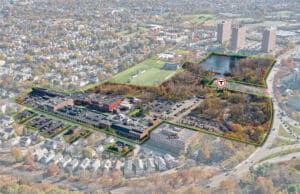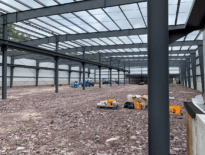Food wholesalers, a construction material manufacturer and a suburban athletic club are all living on borrowed time on sought-after local real estate parcels eyed for major developments.
The recent sales of properties including the 19-acre Widett Circle in South Boston and 26-acre Alewife Park in Cambridge set the stage for new commercial clusters to take shape in emerging development hotspots.
Such covered land plays, in which investors acquire a site with existing tenants, can be attractive to developers waiting to assess how COVID-19 affects future real estate demand and uses while still receiving a steady stream of rent. But they come with their own set of risks, ranging from unknown permitting outcomes to uncertain outlooks for future uses.
“Do you take down a building that’s got cash flow, or do you keep it?” said Carlos Febres- Mazzei, managing principal of Boston-based developer Quaker Lane Capital. “It depends on the profile of the investor, and where they see the [future] rents. That can be very subjective.”
Long-Term Upsides
Recent high-profile redevelopment site deals totaling over $283 million in South Boston, Watertown and Cambridge follow a steady stream of acquisitions in similar neighborhoods such Allston-Brighton and Somerville’s Union Square, where industrial and manufacturing companies have sold their longtime home bases to institutional investors envisioning higher rent-paying uses such as lab space.
The potential long-term upside of the properties contrasts with recent COVID-19-induced uncertainties that have thrown a damper on investment sales of trophy assets such as office towers. The $11 billion spent nationwide on office properties in the second quarter was the lowest for that quarter since 2010, according to Real Capital Analytics.

As an incentive to sell its headquarters in West Cambridge, a life science developer offered GCP Applied Technologies 18 months of free rent while assessing long-term plans for the 26-acre property. Image courtesy of IQHQ
It’s not surprising, then, that deep-pocketed investors are buying development sites big enough to accommodate a flexible mix of uses while collecting income from current tenants.
“These are strategic long-term investments and big dollars for the land itself,” said Aaron Jodka, managing director of research at Colliers International in Boston. “These are not projects that are shovel-ready right now, so there’s years of planning and community outreach, but it shows the confidence that market participants have in Boston, Cambridge and Watertown.”
Much of the recent activity has taken place in the West Cambridge and Watertown submarkets, where the life science sector has expanded. Another 1 million square feet of lab projects are in permitting in Watertown, according to Newmark Knight Frank data.
“Redevelopment plays are really where you can find the development parcels, and they’re in these fringe markets where the industrial buildings have been traditionally. There’s just been a lot of demand,” said Elizabeth Berthelette, director of research for Newmark Knight Frank in Boston.
Incentives to Relocate Existing Companies
Available development sites big enough to accommodate multi-million-square-foot projects are rarer than ever in built-up Greater Boston, driving up prices on covered land parcels. Many contain businesses that need to find replacement locations at a time of record real estate prices, and developers sometimes use their contacts to help existing tenants relocate. That was part of Boston-based Core Investments’ strategy when it assembled a series of parcels near Andrew Square for its Washington Village multifamily development.
Beyond the $125 million purchase price, a life science REIT gave construction additives manufacturer GCP Applied Technologies another incentive to sell its 26-acre headquarters property in Alewife. GCP will occupy the property rent-free for 18 months, while new owner IQHQ Inc. studies development options.
The advent of COVID-19 was partially responsible for a 6.6-acre site in East Watertown changing hands after four decades under family ownership. After the Mount Auburn Club fitness and tennis facility was forced to shut down during COVID-19, Newton-based National Development and life science specialists Alexandria Real Estate Equities paid $32.6 million. An office-lab complex is planned for the Coolidge Avenue site.
“Watertown and Alewife have been huge relief valves for Kendall Square and we’ve seen a lot of success in those markets coming into their own as life science clusters,” Berthelette said.
The tennis club is located about a mile from another former athletic facility on the urban fringe set for redevelopment: the former Skating Club of Boston ice rink, where The Davis Cos. is proposing a 535-unit apartment complex.
Another sought-after parcel, the Widett Circle food wholesalers property, has new ownership by a long-term investor in the nation’s second largest pension fund, the California State Teachers Retirement System. The $246 billion fund has a 92 percent ownership share of the industrial parcel bordering Interstate 93, which attracted intense interest as a development site after being pitched as a potential 2024 Summer Olympics stadium location.

Steve Adams
“Some of these deals have been in the works for a long time, and they are generational deals in terms of being 10- or 15-year development cycles,” Febres-Mazzei said. “That a deal as big as Widett can get sold in this market reinforces how investors and lenders feel about Greater Boston in the long term.”
The Boston metro area has nearly $7 billion worth of commercial investment sales transacted so far in 2020, according to Real Capital Analytics. Boston ranks fourth nationwide, trailing only Dallas, Manhattan and Los Angeles.
Boston’s ranking – up from sixth nationwide in 2019 – reflects the strong fundamentals of the region’s commercial real estate and investors’ confidence in its future prospects, Jodka said.
“These are strategic long-term investments and big dollars for the land itself. It really is showing their confidence in the long-term strengths of Boston,” he said.




 |
| 

